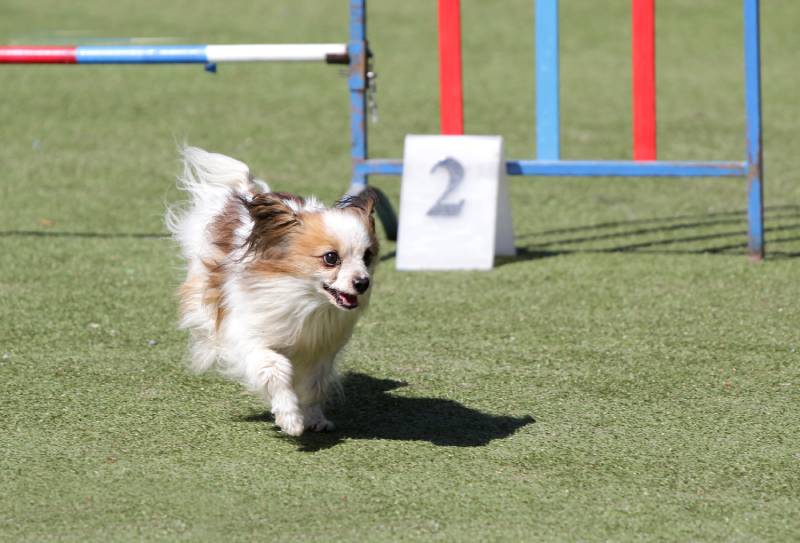Male vs Female Papillon: Differences Explained (With Pictures)
Updated on

Click to Skip Ahead
If you’re planning on adding a Papillon to your family soon, there are several things to consider before signing the adoption papers. One of the most important conversations you need to have with the members of your household is whether you’d like to adopt a male or female Pap.
Most people know that male dogs are generally larger than females, but did you know there are personality differences, too? You must familiarize yourself with the male and female Papillon temperament to find the perfect fit for your home.
Read on to learn about the differences between the sexes to determine which will be the best for your family and lifestyle.
Visual Differences

At a Glance
- Average height (adult): 9–11 inches
- Average weight (adult): 7–11 pounds
- Average height (adult): 8–10 inches
- Average weight (adult): 4–11 pounds
Papillon 101
Papillons are a highly intelligent and self-assured breed. They’re generally very social, though they can be wary around new people until they’ve had a chance to size the strangers up.
Paps make fantastic companion dogs. They are known for their playful and affectionate nature, but it is their always-up-for-anything attitude that makes them highly sought after as pets. They are high-spirited and energetic, so they can easily keep up with active families, though they’re happy to play inside with their toys or run around in their fenced backyard. However, it’s not always go-go-go all the time for the Papillon; after a day of activity, it’s not unusual to find them snuggled up contently in their owner’s arms.
Paps are great for families with children as they’re affectionate and calm around the people they’re bonded to. They make great playmates for kids as they have the energy to keep up with them. However, because Papillons are small, they may be at a slight risk around young children or those that don’t yet know how to respect boundaries around their pets.
Male Papillon Overview

Personality / Character
Male Paps are generally considered to be more affectionate than their female counterparts. They live to love you, though this may make them a little needy. They love to be coddled, and most won’t say no to being carried around during their walks or snuggling under the blanket with their favorite human. Males are generally more loyal than females, following their favorite humans around the home so they can spend every waking moment with them.
Training
Male Papillons tend to be people pleasers, making training them easier. They’ll do everything they can to make their owners happy, including doing tricks and performing tasks on command. They’re often the first choice for owners planning to raise a show or performance dog.

Health & Care
Male and female Papillons are generally healthy, though both sexes may be prone to certain health conditions. This includes luxating patella (when one or both kneecaps pop in and out of place) and dental disease.
Male Paps will naturally be at risk of developing conditions related to their reproductive system, such as prostate tumors.
Since male Papillons bond so intensely with their humans, they may develop separation anxiety if left alone for too long.
Breeding
As gentle as a male Papillon can be, all of that can be thrown out the window if there’s a fertile female around. Their instincts may make them prone to aggression as they become protective and possessive over their potential mate. They can even become aggressive to their potential mates, so if you have a breeding pair of Paps, you’ll need to keep a close eye on them.
Intact male Papillons, as with intact males of any dog breed, will be more prone to mark their territory through urine.
- Loving
- Easy to train
- Prone to anxiety
Female Papillon Overview

Personality / Character
Female Papillons are moody and prissy at times. They love being adored and may want to be petted and treated like a princess constantly. If you fail to give them the attention they seek, they may move to another location in your home and sulk. They are like cats, as they want to be petted and loved on but on their own terms, and heaven forbid you try to give them love outside of their self-appointed attention-receiving time.
Though they are usually more independent than males, females can still be affectionate. They may be less “in your face”, but they’re still charming and loving toward their favorite humans.
Training
Females are more independent than males and are prone to moments of moodiness. They’re less eager to please their humans and are more likely to have a stubborn streak. Couple this headstrong attitude with their propensity toward princess-like behavior, and you have a recipe for disaster when training your female Papillon.
First-time dog owners or those who plan on showing their Papillon would do well to choose a male over a female, as he’ll make training much easier on you.

Health & Care
Male and female Papillons are generally healthy, though both sexes may be prone to certain health conditions. This includes luxating patella (when one or both kneecaps pop in and out of place) and dental disease.
Female Paps will naturally be at risk of developing conditions related to their reproductive system, such as mastitis (a bacterial infection of the breasts) or ovarian tumors.
Breeding
Female Paps can be aggressive when it comes to protecting their young. Owners must keep a close eye on the new mom, especially after her first litter, to see how protective she’ll become.
Like her male counterpart, female Paps may be prone to marking their territory if left intact.
- Independent
- Charming
- Can be aloof
Which Gender Is Right for You?
Male Papillons are generally more affectionate, loyal, and easygoing than their female counterparts. However, they can be prone to anxiety and streaks of aggression and territorial behavior, especially around intact females. Female Papillons tend to be more stubborn, prissy, and moody, though their independent nature makes them less likely to develop anxiety.
However, the above isn’t true of all male and female Papillons. While genetics can certainly play a role in a dog’s temperament, how you treat your pet is just as important. With training and socialization, your Papillon can be well-behaved and well-adjusted, providing you with many years of unparalleled companionship.
Featured Image Credit: Left – Anna Maloverjan, Shutterstock | Right – AndyBir, Shutterstock














